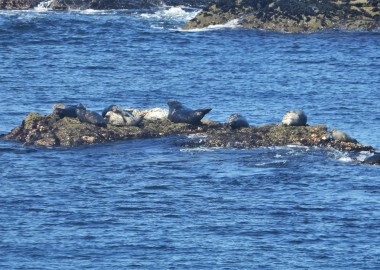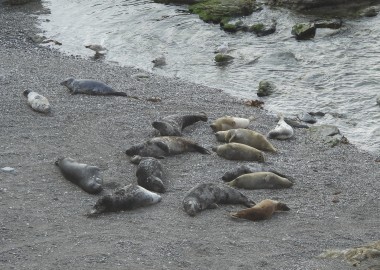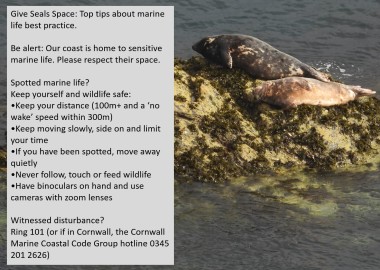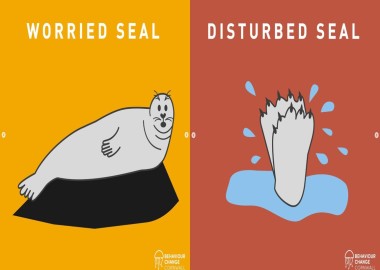Watch Seals Well
We are lucky and privileged to live and work in a country with a beautiful coastline. We want everyone to share amazing marine experiences to spread public appreciation of our coastal wildlife. At the same time, we want all our cumulative activity to have NO negative impact on our fragile coastal habitats and species, particularly our iconic and charismatic seals. We all need to ‘Watch Seals Well’.
Seals need space on land to regularly rest, digest their food and socialise. Disturbance impacts are often invisible and delayed. Pregnant females disturbed in the summer waste energy reserves, so they can’t feed their pups enough in the autumn, which means they die in the winter. Disturbance is always a waste of energy, often results in injury and can be fatal. In the wild every calorie counts and can make the difference between life and death.

Seals can be seen on lots of offshore island and rock ledges

Seals hope to sleep on remote beaches for hours
Many parts of the UK have launched Operation Seabird (#OpSeabird). This is a national initiative that aims to engage with the public, businesses, and community-based organisations to raise awareness about the sensitivities of our coastline and show how simple changes can reduce pressure on our unique marine life and fragile habitats.
Lots of statutory agencies and NGOs are working together in the Marine Mammal Disturbance Partnership to create a national Marine and Coastal Wildlife Code and Stickers (for cars and watercraft). The Seal Research Trust chair the Seal Alliance Disturbance Group of grassroots seal conservation groups. They created national Signs and Leaflets. Looe Marine Conservation Group created stickers to help reduce paddle based disturbance.
SRT Trustees Dan and Sue are both active course delivers for the national Wildlife Safe Scheme (WiSE). WiSE aims to promote responsible wildlife-watching, through training, accreditation and raising awareness. Dan and Sue deliver input about seals, cetaceans and seabirds to Boat Operators, Adventure Activity Providers and the Public – spreading best practice messaging about enjoying marine life without impact.

Top tips for best views of seals

If a seal looks at you, back away
We need to leave seals how we find them. Like seabirds, they are highly vulnerable to human disturbance on land. We need to avoid approaching any of the places they choose to rest. Let’s all Give Seals Space! Together we can be a powerful force for good, ensuring we leave our coastal ecosystem in a better condition than when we started – for our children and their children to enjoy. Thank you!
Many thanks to all our volunteers who spend thousands of hours each year helping to keep our precious marine life safe. Special thanks to Looe Marine Conservation Group and Behaviour Change Cornwall for their wonderful worried and disturbed seal graphics.
Don’t think this is an issue – read our report – click here to download it.
Click here to download loads more resources on this issue.
Please support these volunteers by donating or joining our Wild Seal Supporter and Adoption Scheme – click here to find out more.
